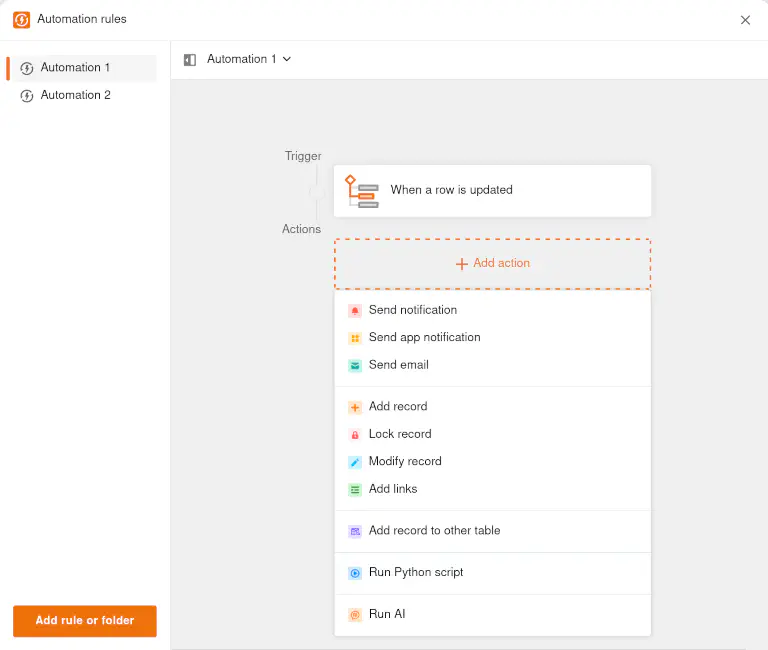The challenges of the IT skills shortage #
According to US estimates, there will be a shortage of around 4.3 million IT workers worldwide by 2030. Although the economic slowdown in the global economy has eased the situation somewhat, digitalization continues to advance, meaning that more IT experts will be needed in the long term. Accordingly, the IT labor market has grown considerably in recent years and has become increasingly differentiated.
Why the IT skills shortage is harming companies #
The digital transformation is leading to an increasing demand for new qualifications and specializations that our education system has not yet been able to adequately cover. For companies, this personnel gap in IT means that they can produce fewer innovations and work less efficiently as the digitalization of their processes is delayed. In addition, a lack of IT staff also poses threats to the smooth running of operations – because IT experts ensure the security, integrity and availability of systems. In an emergency, a shortage of such specialists can paralyze the entire company. In the long term, the shortage of IT specialists therefore raises the question of the technological and economic competitiveness and future viability of companies and their locations.

There is not a shortage of IT specialists everywhere #
The Hays Professionals Index shows that the IT skills shortage varies greatly between industries and occupational groups. While demand in the automotive industry and mechanical engineering has fallen significantly, other sectors of the economy are still desperately looking for IT specialists. In addition, certain occupational groups such as IT security specialists, database developers and IT architects are extremely sought-after, whereas demand for traditional IT professions in development, administration and support is declining.
This could be related to the fact that some tasks in these areas can now be simplified, accelerated or completely taken over by automated processes, cloud services and AI-supported tools. Some companies are already using artificial intelligence to counteract the shortage of IT specialists and want to use AI to replace missing IT experts. However, the demand for AI specialists will increase and new job profiles will emerge.
Problems faced by companies with a shortage of IT specialists #
Many companies complain that suitable candidates are not willing to relocate. This is proof that the shortage of IT specialists also varies from region to region and that companies with less attractive locations have a hard time. At the same time, however, the companies themselves admit that they do not meet the desires for mobile working and flexible working hours. A lot of potential remains untapped here, as most jobs in IT do not require an office presence. In some IT jobs these days, it is even common to be able to work wherever and whenever you want.
However, the biggest gap is between the salary expectations of applicants and what employers can or want to pay. Most IT professionals know their worth, of course, because they hear everywhere that they are a scarce and highly competitive resource. They can often choose from several job offers and pick the best one. On the other hand, recruiters usually have a limited budget and need to find highly qualified IT professionals who are satisfied with an average salary.

Solutions for the IT skills shortage #
In macroeconomic terms, there is only one solution to the skills shortage: increase the number of IT professionals to meet demand. Instead of hoping for political relief and incentives (e.g. for the immigration of skilled workers), companies can also make a difference themselves.
Some already have artificial intelligence on their radar as a potential solution to the IT skills shortage. However, AI can currently only replace manual processes that can be standardized and automated. Overall, the increased use of AI will probably even increase the demand for IT specialists – only the demand for certain job profiles will decrease.
Lateral entry without an IT degree #
Some companies are taking the promising approach of lowering the requirements for formal educational qualifications in order to attract more IT specialists. According to the German Bitkom study, every fourth IT job now goes to a lateral entrant, which means that lateral entry is just as common as an IT degree. Most career changers have a non-specialist university degree or vocational training without an IT background, but have acquired sufficient IT skills through self-tuition, further training or professional experience.
Companies that cannot pay high salaries should also consider giving study dropouts without a formal degree a chance. They often include the biggest cracks, who are passionate about IT and gain a lot of practical experience in their free time.

Hire young professionals or train them yourself #
Instead of expensive IT experts with decades of professional experience, it may be sufficient for certain IT positions to hire entrants to the profession after an IT degree or IT traineeship. They usually have some experience, but need more guidance and training. On the other hand, they can be deployed flexibly and are significantly cheaper than an IT specialist in a specific field.
In the long term, of course, it makes the most sense to hire IT working students or train IT professions in your own company. In this way, you can retain people in your company from the very beginning of their professional life and prepare them for a later career in IT in order to prevent a shortage of IT specialists. The disadvantage is that you invest a lot of effort internally in trainees and students who you can initially only use for simpler tasks.
Promote further training for tech-savvy employees #
According to the Bitkom study , almost a third of companies have training programs to qualify employees for new tasks. This makes it by far the most frequently cited way of countering the shortage of IT specialists – and it makes a lot of sense. After targeted training, employees in specialist departments can often take on tasks themselves that would otherwise have to be carried out by IT specialists.
In particular, tech-savvy employees without in-depth IT knowledge – so-called citizen developers – can make a valuable contribution to the digital transformation at the interface between IT and specialist departments. They know the business processes inside out and experience where things get stuck on a daily basis, so they can provide the most input in innovation projects as to which processes could be optimized, digitalized or automated.

Why No Code can be the solution #
No Code is an approach that effectively counteracts the IT skills shortage by enabling tech-savvy users without formal IT qualifications to actively shape the digital transformation. This entails a fundamental paradigm shift: traditional software development requires learning programming languages and lengthy familiarization with development tools. With a no-code platform, on the other hand, anyone can develop their own applications without any IT or programming knowledge. Prefabricated elements can be assembled into ever new software solutions using drag-and-drop.
In this way, employees in your specialist departments can develop applications that are individually tailored to their processes, which previously had to be done by specially trained IT specialists. This relieves the IT department and enables the specialist departments to map and digitalize their processes exactly as they want. The fact that the specialist departments are directly involved in the development process and fewer feedback and waiting loops are required increases both the speed of the digital transformation and the accuracy of fit of the solutions. And last but not least, companies need fewer IT specialists overall, who can also concentrate on more demanding tasks that really require their expertise.
Since most no-code platforms are cloud solutions that do not require you to have your own server infrastructure, many tasks that normally require IT administrators are also eliminated. Nevertheless, no-code developers are of course required to implement and maintain the no-code platform and to be available to citizen developers as contact persons. To prevent uncontrolled no-code shadow IT, there should be a central no-code strategy that the IT department must develop and implement. This includes the training of at least one citizen developer per department, a transparent overview of all applications and an understanding of IT’s role as a partner at eye level.
Advantages of No Code for your company #
No-code platforms bring the following benefits to your company:
-
Accelerating digital transformation: No Code simplifies the creation of customized applications. As a result, no-code development is up to 90 percent faster than traditional development from requirements analysis to implementation.
-
Democratization of IT: In principle, no-code platforms enable all employees to develop applications independently. This makes you less dependent on hard-to-find IT experts, who were previously essential for every solution, no matter how small.
-
Reduce costs: The use of No Code can significantly reduce development costs by using less expensive specialists to achieve a comparable or even better result in less time.
-
Relief for the IT department: With No Code, the roles are clearly distributed – the IT specialists define the framework, the specialist departments provide the process knowledge and create the solution themselves. In this way, No Code relieves the burden on IT, which only has to manage No Code Development.
-
Greater flexibility: In a fast-moving working world, no-code tools allow the specialist departments to react quickly to changes and make adjustments to their processes themselves.
-
Automated, AI-supported processes: Automation and AI features are built into many no-code platforms, allowing you to replace manual processes and minimize human error.

Use SeaTable as a no-code platform #
SeaTable makes it easy to take advantage of no-code development. Start with the free version and discover all the basic features of the no-code solution: intuitive data management , easy visualization and evaluation (e.g. with views and statistics) and the integrated no-code app builder, with which you can create your own applications without having to write a single line of code.
In contrast to non-European solutions, SeaTable offers you secure data protection: When you implement the SeaTable Cloud as a no-code platform, your data is stored in German data centers in compliance with GDPR and protected from being passed on to servers in the USA and other countries.
Another advantage that makes SeaTable as a no-code platform stand out is the free choice of deployment type. Benefit from the convenience and scalability of the SeaTable Cloud or retain full control and data sovereignty with an on-premises installation of SeaTable Server .
Conclusion: mitigating the IT skills shortage with No Code #
All in all, no-code platforms are the most promising approach to mitigating the skills shortage in IT and accelerating digital transformation. Although they do not increase the number of available IT specialists, they reduce the need for traditional software development and enable users in specialist departments to create their own solutions. As a result, no-code programming relieves the IT department of tasks that can also be performed by citizen developers.
Ultimately, with No Code you can save on additional IT positions that would be difficult to fill anyway. However, professional IT specialists remain indispensable and, thanks to No Code, can concentrate on more complex tasks that really require in-depth IT knowledge.
FAQ on the IT skills shortage and No Code #
Why do people earn so much in IT?
Is there a skills shortage in IT?
Can No Code replace IT jobs?
For which tasks do IT specialists remain indispensable?
TAGS: Applicants & Talents Management No Code & Low Code Digital Transformation
